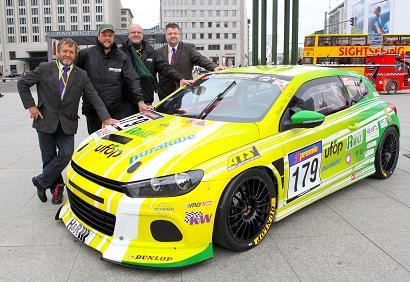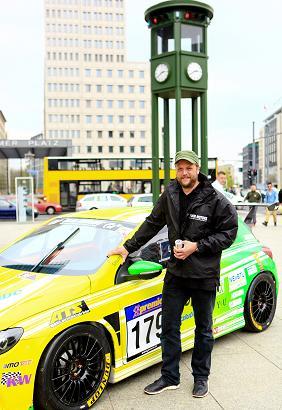German rapper Smudo's bioconcept car to perform in 24-hour race




Photo: UFOP
April 30, 2013
BY UFOP
On May 19, more than 200 race cars will start at the traditional ADAC 24-hour race on the Nürburgring's legendary Nordschleife track. With more than 200,000 visitors, it is the largest motor sporting event of the year. Also present this year is the prominent musician Smudo, who replaces his three Fantastic Four bandmates for 24 hours with three racing colleagues. These are the TV test driver Tim Schrick, team manager and former DTM driver Thomas von Löwis of Menar and rookie driver Aris Varvaroussis. This quartet of drivers is not the only focus of attention, but also the vehicle used by them, a Volkswagen Scirocco, which was developed into a bioconcept car. Smudo presented the race car, which was equipped with innovative rapeseed-based biofuel and constructed from biocomposites and biopolymers, together with his team colleagues and the Union for the Promotion of Oil and Protein Plants (UFOP) on April 23 exclusively in Berlin.
The venue was the Potsdamer Platz, where the car, baptized by fans as "BioRocco," attracted inquisitive glances while standing next to the replica of one of Germany's first traffic lights.
Advertisement
For Smudo, this is his 12th start at this long distance classic race, dubbed the "green hell," which places great demands on both man and materials. In eleven of these races, both Smudo and team manager von Löwis of Menar have relied on RapsPower. "Over the past 10 years, we have shown that racing and sustainability are not mutually exclusive," said Smudo. "With the use of biomaterials and various rapeseed oil-based fuels, from pure biodiesel, to B30 blends, to the currently used blends made from HVO and RME, we have always demonstrated a pioneering spirit in terms of green racing."
This year, the Four Motors team at the ADAC 24-hour race relies on "Diesel-renewable," a 100-percent biofuel that consists almost entirely of hydrogenated rapeseed oil (HVO) produced by the Finnish company Neste Oil under the NExBTL brand name. This HVO fuel is used not only in cars and commercial vehicles, but also has demonstrated its performance and reliability in well over 1,000 Lufthansa flights between Frankfurt and Hamburg. Moreover, this year the team is involved in a fuel research project where the so-called "Rmax" biofuel is subjected to intensive bench tests. This Rmax blend is composed of equal parts of rapeseed methyl ester (biodiesel) and rapeseed oil-HVO. What makes the Rmax blend used in the bioconcept car so special, according to team manager Tom von Löwis of Menar, is its DIN conformity. "Our fuel exceeds practically all parameters of the DIN EN 590 diesel standard. We only deliberately exceeded the prescribed maximum limit of 7 percent biodiesel for normal diesel in order to demonstrate how great the technical potential of this kind of biofuel is," said the former DTM driver.
Advertisement
For Smudo and his driver colleagues, the use of biofuels is tied to a clearly defined requirement. The sustainability of the raw materials used must be guaranteed. This is why, for more than 10 years, the team has been working together with the agricultural association, UFOP, which launched and accompanied the rapeseed oil-based fuels into the German market. Association president Wolfgang Vogel said on this collaboration, "It is well known that biofuels can be produced from a variety of agricultural commodities, which is not always unproblematic in terms of their sustainability. For this reason, Smudo's team looked for a way to exclusively use biofuels based on domestically grown rapeseed. We, as representatives of all German farmers, companies and organizations involved in the production, processing and marketing of rapeseed, can ensure this. The sustainable production of rapeseed in this country is guaranteed because the entire German rapeseed production is certified as sustainable. The entire production chain is recorded and documented in its various stages. This makes it possible to trace the rapeseed oil's point of origin and processing path up to the rapeseed fields of our farmers."
Visit www.fourmotors.de and www.UFOP.de for more information on the bioconcept car and this year's implementation at the ADAC 24-hour race on May 19 and 20. The official race website is www.24h-rennen.de.
Related Stories
Airbus is taking a significant step toward scaling the adoption of sustainable aviation fuel (SAF) by testing a new “Book and Claim” approach. This initiative aims to boost both supply and demand for SAF worldwide.
Signature Aviation, the world’s largest network of private aviation terminals, has announced the expansion of its blended SAF offering at six new locations across Europe following multiple blended SAF supply agreements.
Virgin Australia has entered an agreement with Viva Energy to SAF for its flights departing from Proserpine, Queensland. The SAF will consist of Jet A1 and a 30-40% synthetic blend component made from waste and residue feedstocks.
The largest single volume order of sustainable aviation fuel (SAF) by a DB Schenker customer has been placed by Mercedes-Benz. The order is for approximately 13,000 metric tons of SAF and is expected to reduce CO2 emissions by 40,000 metric tons.
ADM and Loyola University Chicago Searle Biodiesel Lab have joined the expanding B20 Club. Founded in 2014, the B20 Club is a partnership between the Illinois Soybean Association and American Lung Association.
Upcoming Events










